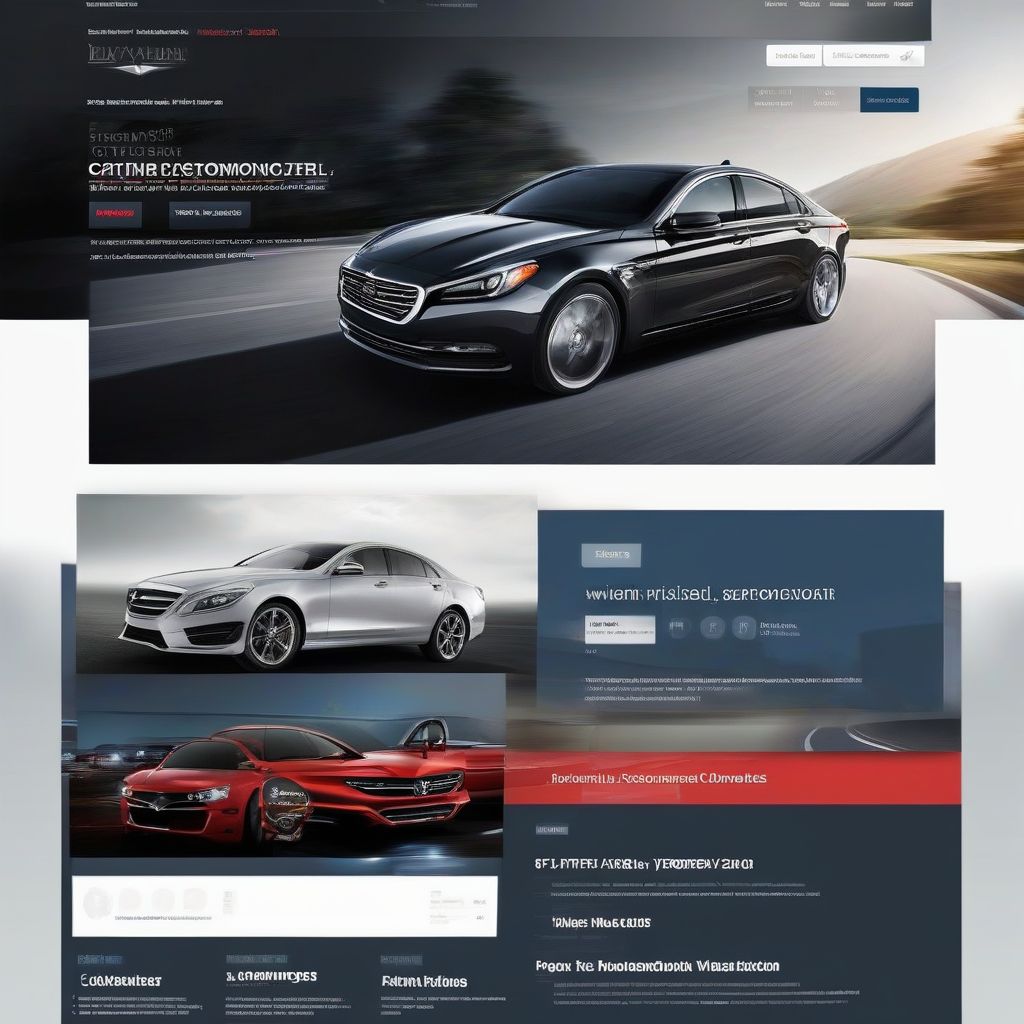The automotive industry is no stranger to evolution. From the first horseless carriages to today’s sleek, tech-laden vehicles, the journey has been defined by adaptation. Today, another significant shift is underway, driven by the digital revolution. As consumers increasingly turn to the internet for their car-buying needs, Automotive Dealer Digital Marketing is no longer a luxury – it’s a necessity.
Gone are the days when a flashy showroom and a persuasive salesperson were enough. Today’s car buyers are online, researching, comparing, and even making purchase decisions before stepping foot in a dealership. This means dealerships must establish a strong online presence to remain competitive and thrive in the digital age.
Understanding the Landscape: What is Automotive Dealer Digital Marketing?
Automotive dealer digital marketing encompasses all the strategies used to reach, engage, and convert potential car buyers online. It’s about building relationships, fostering trust, and guiding customers through their entire car-buying journey – from the initial research phase to final purchase and beyond.
This multifaceted approach leverages various digital channels, including:
- Website Optimization: A user-friendly, mobile-responsive website is the cornerstone of any successful automotive digital marketing strategy. It serves as a virtual showroom, providing essential information about your dealership, inventory, financing options, and more.
- Search Engine Optimization (SEO): Ensuring your dealership’s website ranks high on search engine results pages (SERPs) like Google is crucial for attracting organic traffic. Effective SEO involves optimizing your website content with relevant keywords, building high-quality backlinks, and creating local SEO listings.
- Search Engine Marketing (SEM)/Pay-Per-Click (PPC): Paid advertising campaigns can provide an immediate boost in visibility, driving targeted traffic to your website. Platforms like Google Ads allow you to target specific demographics and keywords to ensure your ads are seen by the right audience.
- Social Media Marketing: Platforms like Facebook, Instagram, and even TikTok provide valuable avenues for connecting with potential customers. Sharing engaging content, running targeted ad campaigns, and interacting with your audience fosters brand awareness and builds community.
- Content Marketing: Creating and distributing valuable, relevant content is essential for attracting and engaging your target audience. Blog posts, articles, infographics, videos, and interactive tools can establish your dealership as a trusted source of information and influence car-buying decisions.
- Email Marketing: Building an email list and nurturing leads through targeted email campaigns remains a powerful strategy. Email allows you to stay top-of-mind, deliver personalized offers, and guide potential customers through the sales funnel.
- Reputation Management: Online reviews and ratings can make or break a dealership’s reputation. Actively monitoring and responding to reviews, addressing concerns, and encouraging positive feedback is vital.
Answering the Call: Addressing Common Questions About Automotive Dealer Digital Marketing
As dealerships navigate the complexities of the digital landscape, it’s natural to have questions. Here are answers to some common inquiries:
1. Why is Automotive Dealer Digital Marketing So Important?
Simply put, it’s where your customers are. Consider these statistics:
- 95% of car buyers use digital channels as a source of information during their car-buying journey.
- 68% of car buyers start their research online before ever visiting a dealership.
- 72% of consumers who search for a local business online end up visiting a store within five miles.
These figures underscore the undeniable shift in consumer behavior. By embracing digital marketing, dealerships can:
- Reach a wider audience: Online channels expand your reach far beyond your local area, connecting you with potential customers you wouldn’t otherwise reach.
- Target specific demographics: Digital marketing allows for precise targeting, ensuring your message reaches the right people at the right time.
- Generate high-quality leads: By attracting potential customers actively seeking information about cars and dealerships, you can generate leads more likely to convert into sales.
- Build brand awareness and loyalty: Engaging content and a strong online presence contribute to a positive brand image and foster lasting relationships with customers.
- Track results and measure ROI: Unlike traditional marketing methods, digital marketing provides valuable data and analytics, allowing you to measure the effectiveness of your campaigns and make data-driven decisions.
2. What are the Key Elements of a Successful Strategy?
A successful automotive dealer digital marketing strategy is built on a strong foundation of:
- A User-Friendly Website: Your website is your digital storefront. It should be visually appealing, easy to navigate, and optimized for mobile devices. Ensure it provides comprehensive information about your inventory, services, financing options, and contact details.
- Compelling Content: Content is king in the digital world. Create informative and engaging content that resonates with your target audience. This could include blog posts about new car models, videos showcasing vehicle features, or infographics comparing different financing options.
- Strategic SEO and SEM: Implementing effective SEO strategies will improve your website’s organic ranking on search engine results pages. Complement this with targeted SEM campaigns to drive immediate traffic and generate leads.
- Active Social Media Presence: Establish a presence on the social media platforms where your target audience spends their time. Share engaging content, interact with your followers, and run targeted ad campaigns to maximize your reach.
- Email Marketing Automation: Build an email list and segment it based on demographics and interests. Use email marketing automation tools to send personalized messages, targeted offers, and valuable content to nurture leads and drive conversions.
- Reputation Management: Proactively manage your online reputation by monitoring review sites, responding to feedback, and addressing any negative reviews promptly and professionally.
3. How Can I Measure the Success of My Digital Marketing Efforts?
One of the most significant advantages of digital marketing is the ability to track and measure results. Key metrics to monitor include:
- Website Traffic: Track the number of visitors to your website, where they’re coming from, and which pages they’re visiting.
- Leads Generated: Measure how many leads you’re generating through your website, forms, and other digital channels.
- Cost-Per-Lead (CPL): Determine the average cost of acquiring a lead through your digital marketing efforts.
- Conversion Rates: Track how many leads convert into actual customers.
- Return on Investment (ROI): Calculate the overall return on investment for your digital marketing campaigns.
By analyzing these metrics, you can identify what’s working well and areas for improvement. This data-driven approach ensures you’re maximizing your budget and achieving the best possible results.
Embracing the Future: Why Automotive Dealer Digital Marketing is Non-Negotiable
The automotive industry is undergoing a digital transformation, and dealerships that fail to adapt risk being left behind. By embracing the power of automotive dealer digital marketing, dealerships can connect with more customers, generate higher quality leads, and thrive in the ever-evolving digital landscape.
Remember, digital marketing is not a one-time effort; it’s an ongoing process of refining, adapting, and optimizing your strategies to align with changing consumer behaviors and emerging technologies. By staying informed, embracing innovation, and prioritizing the customer experience, dealerships can navigate the digital age with confidence and achieve sustainable growth.



